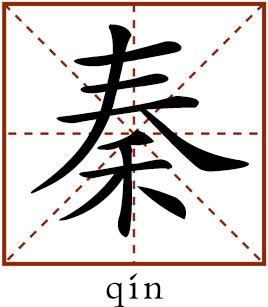Qin

This character usually refers to the Qin Dynasty (221–207 BCE). This short-lived dynasty was the first unified and power-centralized dynasty in China’s history.
秦时明月汉时关
qín shí mínɡ yuè hàn shí ɡuān
Qin and Han refer to the Qin and Han dynasties. Ming yue means the bright moon. The character shi means “of the time” and Guan means “pass.” This term means the moon and the pass of the Qin and Han dynasties.
This is the first line from the poem, “Chu Sai” (“On the Frontier”), by Wang Changling (c. 698–757), a poet of the Tang Dynasty. “The moon still shines on mountain passes as of yore,/ How many guardsmen of the Great Wall are no more!/ If the Flying General [and the General of the Battle of Dragon City ] were still there in command,/ No Tartar horses would dare to invade our land. ” (trans. Xu Yuanchong)
The first line states that the moon still shines on mountain passes as it had done for hundreds of years since the Qin Dynasty. It indicates that conflicts and battles have never ceased on the frontier since the Qin and Han eras. The second line shows Wang’s sympathy towards soldiers sent to garrison the borderland. Many of them had been killed in wars, those who survived had to defend the frontier area and seldom returned home. This also reflects a grave problem that faced dynasties spanning from the Qin to the Tang—unrest on the borderland in northwestern China caused by nomads.
Therefore, Wang expresses his concern and angst that there were no military leaders as good as the General of the Battle of Dragon City and the Flying General, to lead the army to defeat the invaders at that time. The General of the Battle of Dragon City indicates the famous Han general Wei Qing (?–106 BCE), who is known for his successful raid of the holy city of Xiongnu. Flying General was the nickname of another Han general Li Guang (?–119 BCE), who was known to the Xiongnu as a tough opponent. The poem reflects Wang’s complex feelings, including his hatred towards the wars, his sympathy towards people who suffered from an uneasy life, his dissatisfaction at the failure of the government to select good military leaders and the profound love for his motherland.
edited by REN GUANHONG
